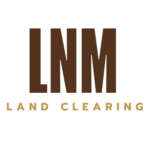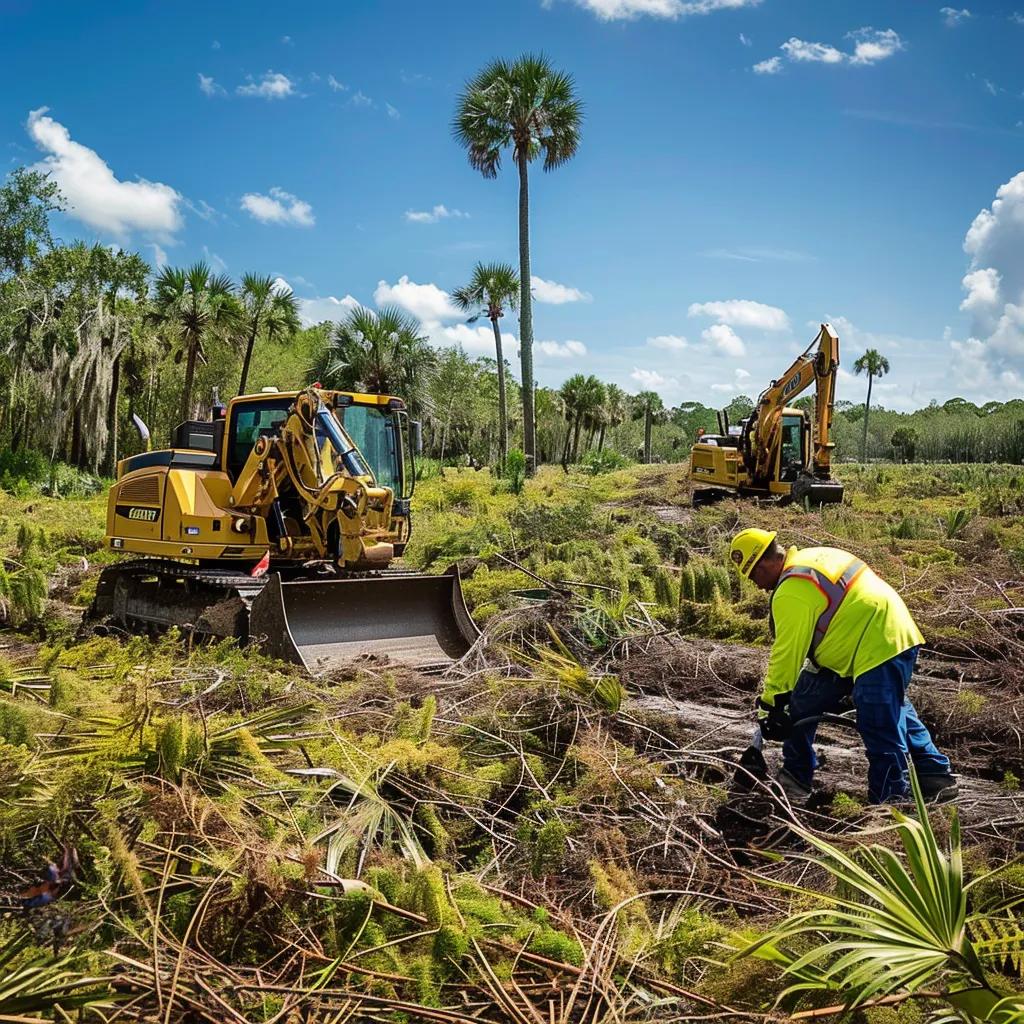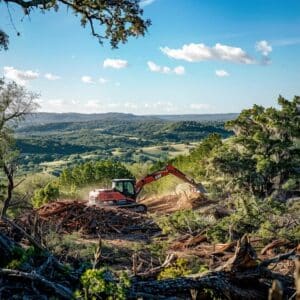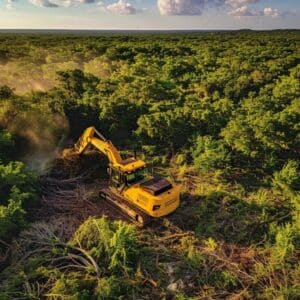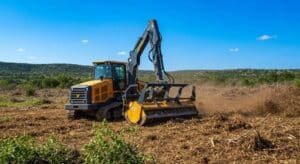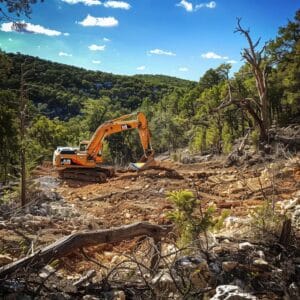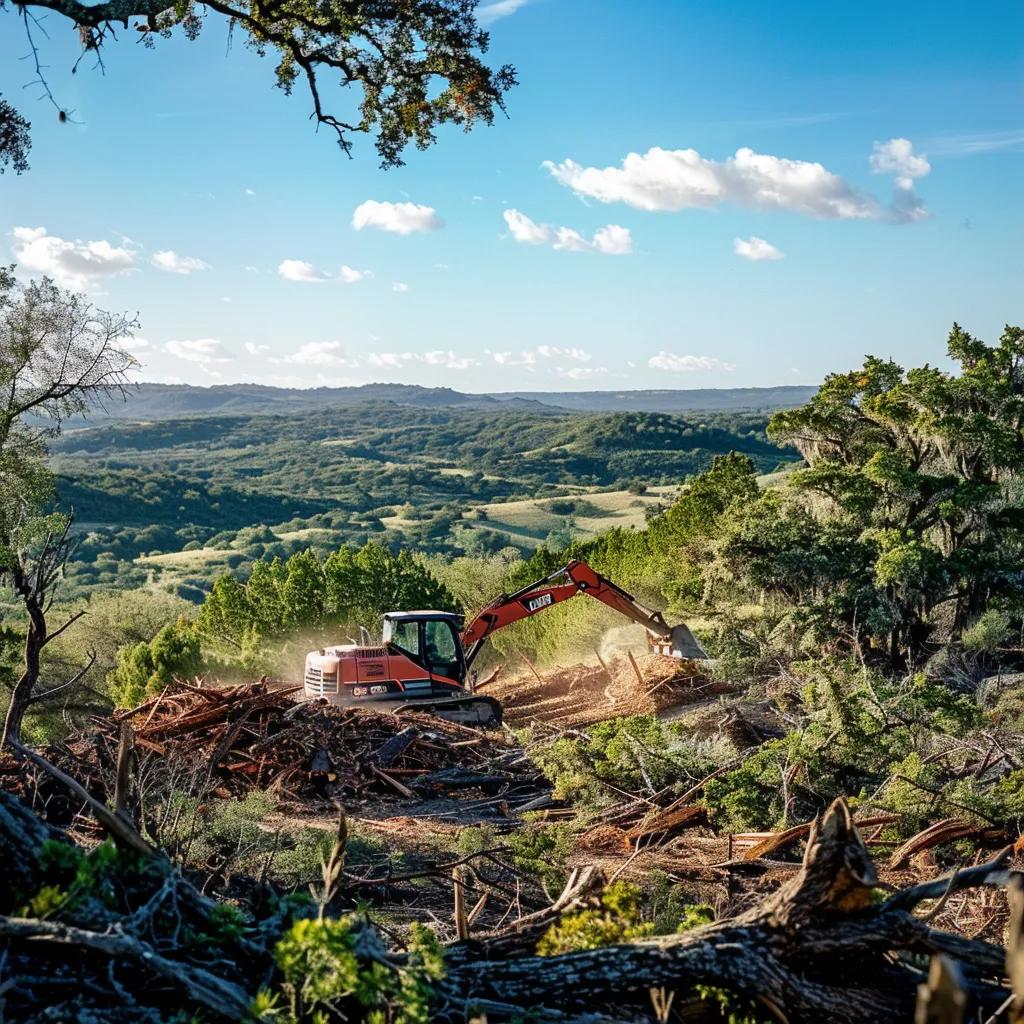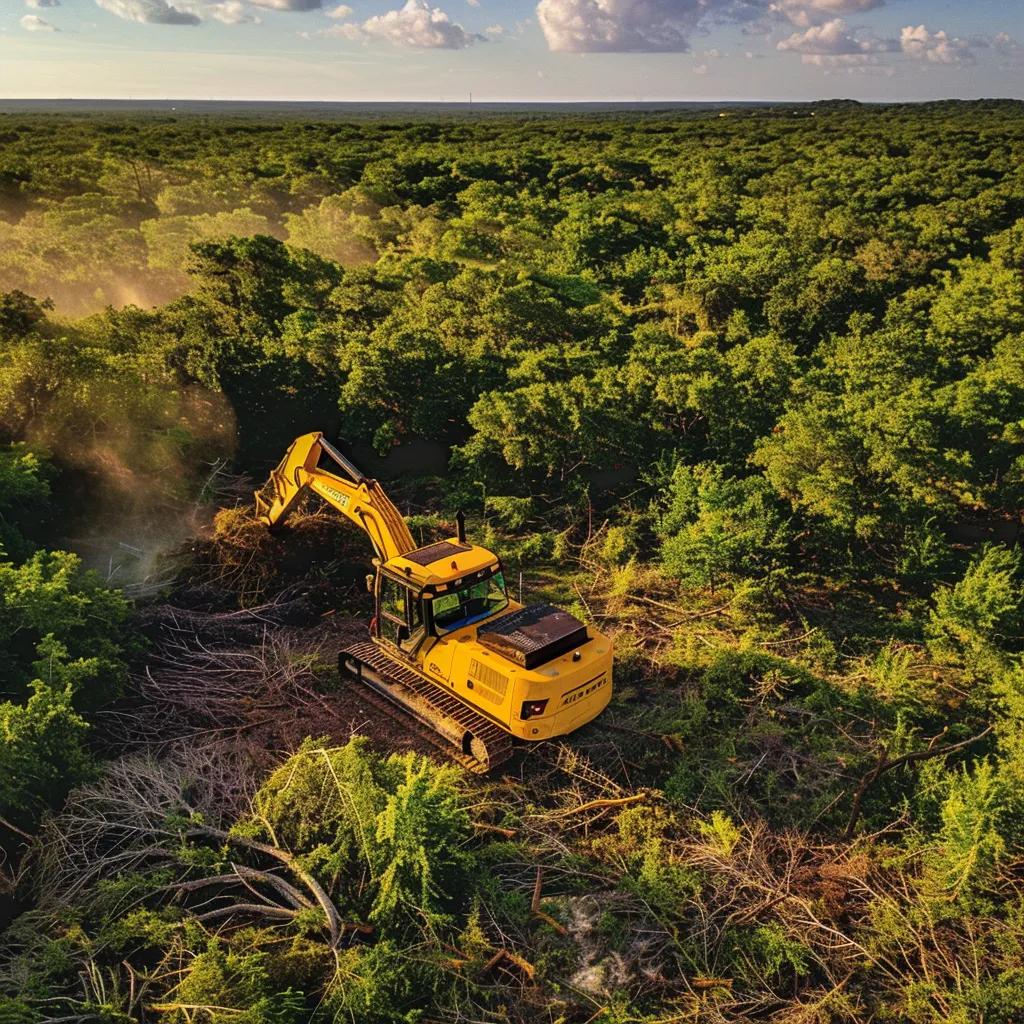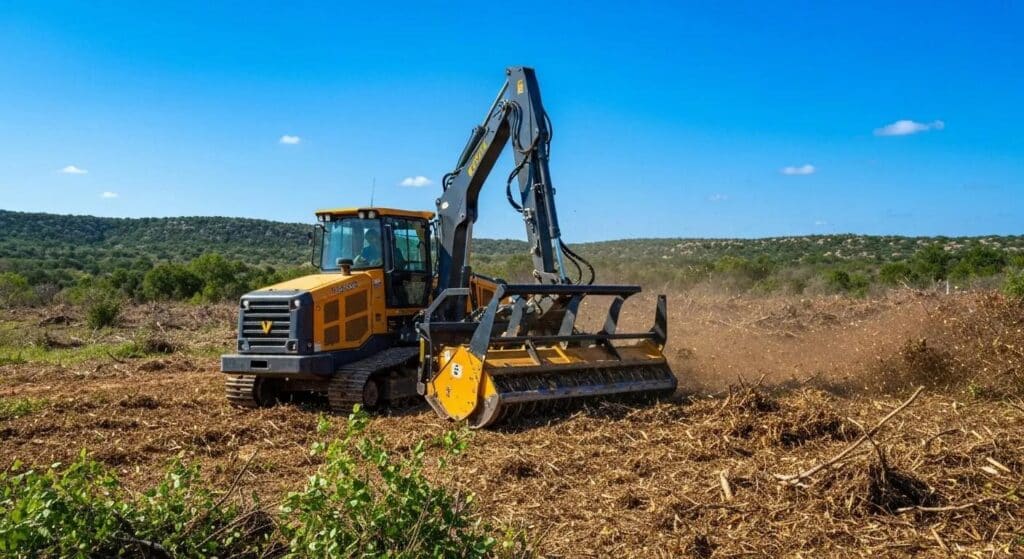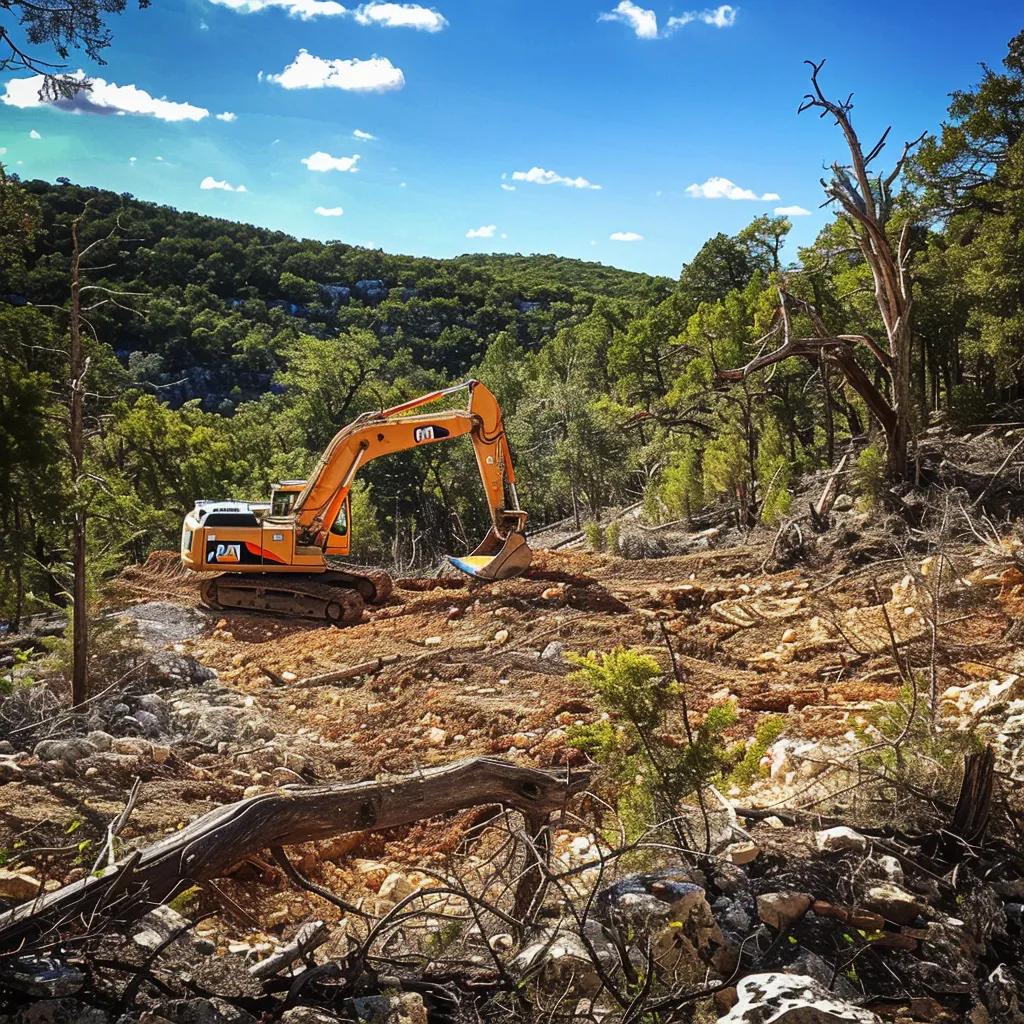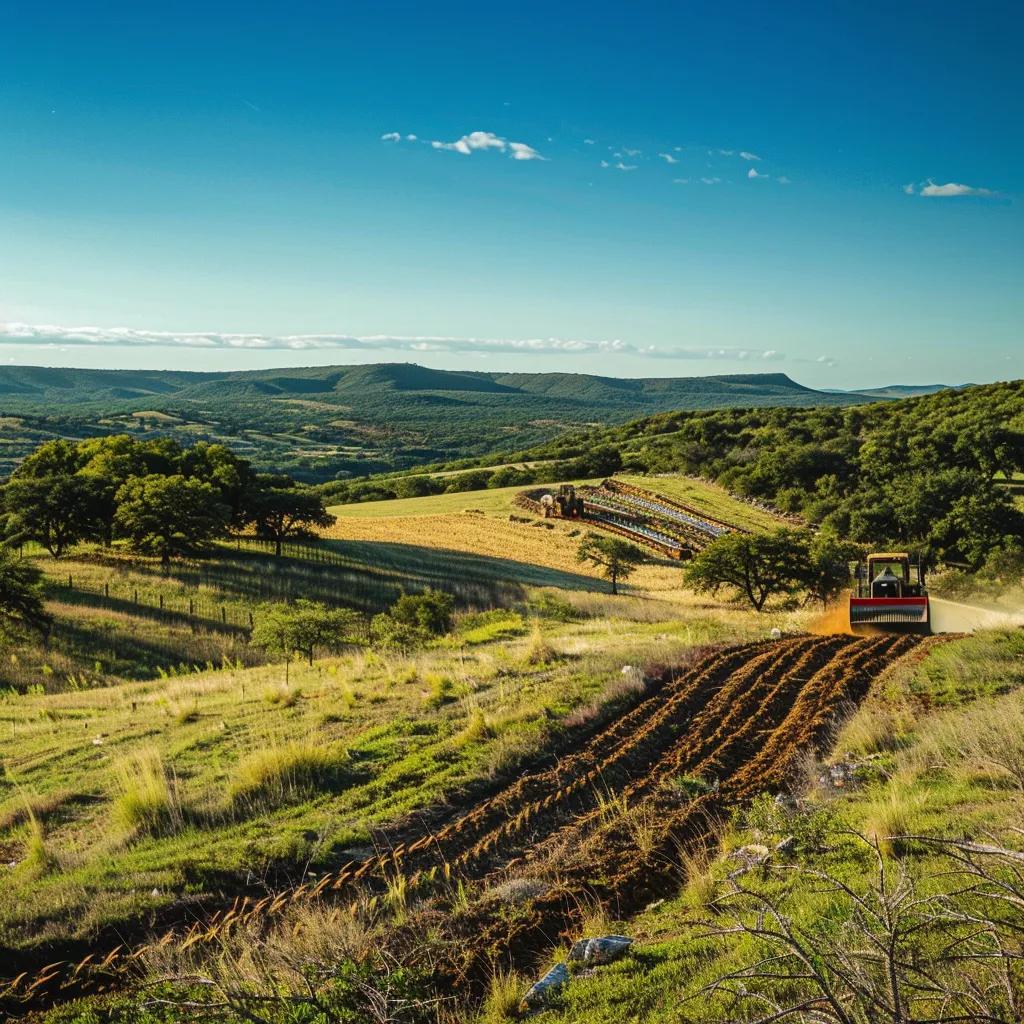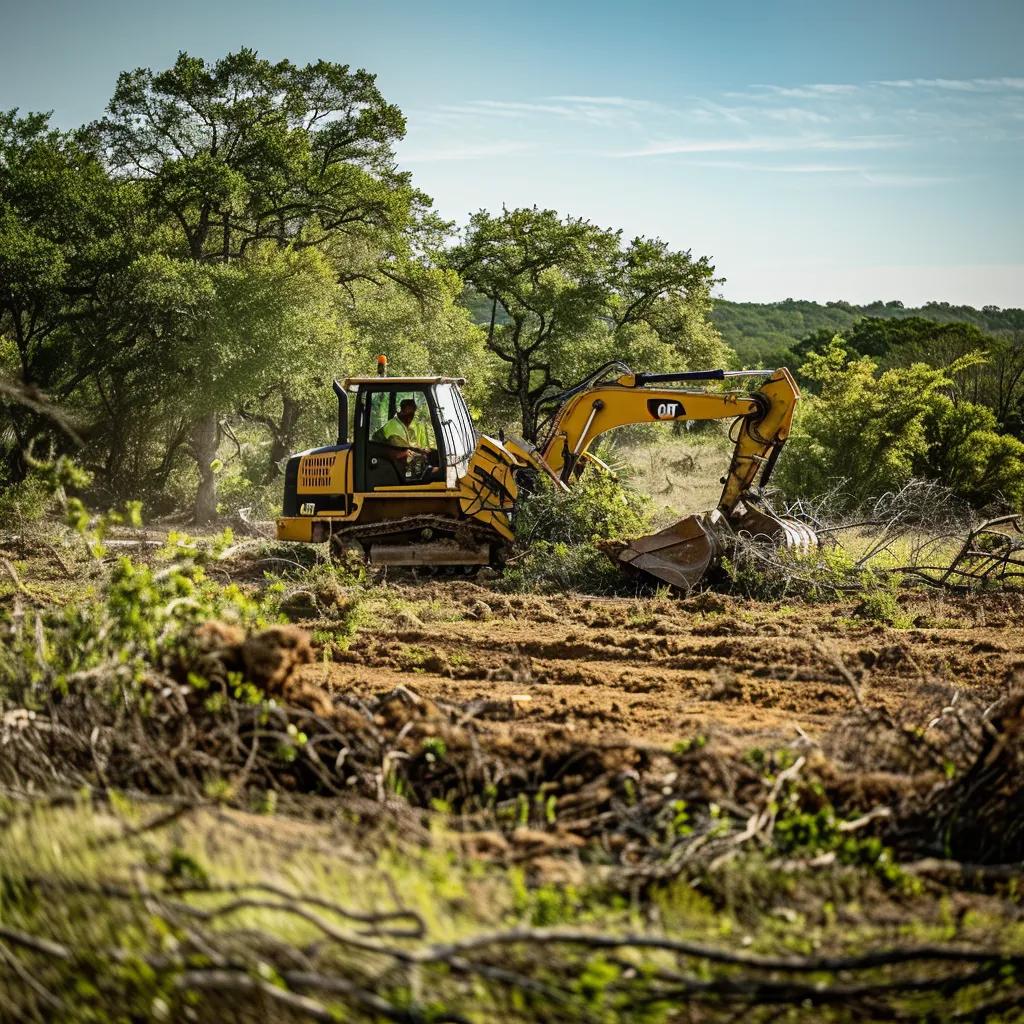Reclaiming overgrown Texas land requires more than basic tools—it demands brush clearing services near me that work with proven results. Whether you’re battling wildfire hazards, pest infestations, or restricted land use, professional brush clearing offers immediate solutions tailored to local terrain. This guide breaks down everything you need to know: the value of expert land clearing, efficient equipment and techniques, average brush clearing costs in Texas, native vegetation challenges, and the step-by-step process that turns dense undergrowth into usable space. You’ll also learn when to hire a pro versus attempting it yourself—and why Texas Land Clearing Contractors are trusted for brush clearing services that deliver real transformation across residential, ranch, and commercial properties.
Benefits of Professional Brush Clearing Services Near Me
Professional brush clearing services bring together advanced equipment, safety protocols, and environmental expertise to efficiently reclaim overgrown land. For Texas property owners, hiring local experts ensures more than just land cleanup—it delivers safer, healthier, and more usable acreage. The benefits range from fire prevention and ecosystem restoration to higher property value and legal compliance.
Dense underbrush often conceals hazards like pests, fire risks, and unstable ground. Clearing it professionally improves safety, speeds up land projects, and sets the foundation for sustainable land use. Below, we explore three major advantages of choosing brush clearing services near me that work.
Brush Clearing Improve Safety and Fire Prevention
Removing overgrown brush reduces the threat of wildfires by eliminating flammable vegetation near homes, barns, and utility lines. Professional services create defensible zones that stop fires from spreading, particularly in dry regions of Texas where fire risk is high.
Key safety benefits include:
Eliminating ladder fuels (low limbs, dense shrubs) that allow fire to climb into treetops
Creating cleared zones and firebreaks that slow or stop wildfire movement
Mulching debris into ground cover rather than relying on risky burn piles
Professionally cleared land also allows for easier emergency access, protecting both people and property. Safety-focused brush clearing is often the first step toward enhancing land’s environmental health.
Environmental Benefits of Expert Brush Removal
Beyond fire protection, brush clearing plays a critical role in restoring ecological balance. Using methods like forestry mulching, contractors break down invasive growth into nutrient-rich mulch that supports native plant recovery and erosion control.
Environmental gains include:
Organic mulch that retains moisture and prevents soil runoff
Better conditions for native grasses, wildflowers, and wildlife habitats
Reduced emissions and ground disturbance compared to traditional excavation or burns
These sustainable outcomes align with Texas conservation goals and help landowners meet local environmental regulations—while improving the land’s overall vitality.
Brush Clearing Increase Property Value and Usability
Professionally cleared land is more attractive to buyers, renters, and developers. Brush removal can increase property value by 10–15%, opening new possibilities for grazing, gardening, recreation, or development.
Clear land allows for:
Improved curb appeal and visibility
More usable space for fencing, livestock, gardens, or new builds
Easier access for routine maintenance or infrastructure projects
These upgrades aren’t just cosmetic—they unlock long-term value and function. Professional clearing prepares your land for its next phase, whether that’s a ranch expansion, home build, or resale.
Brush Clearing Methods and Equipment
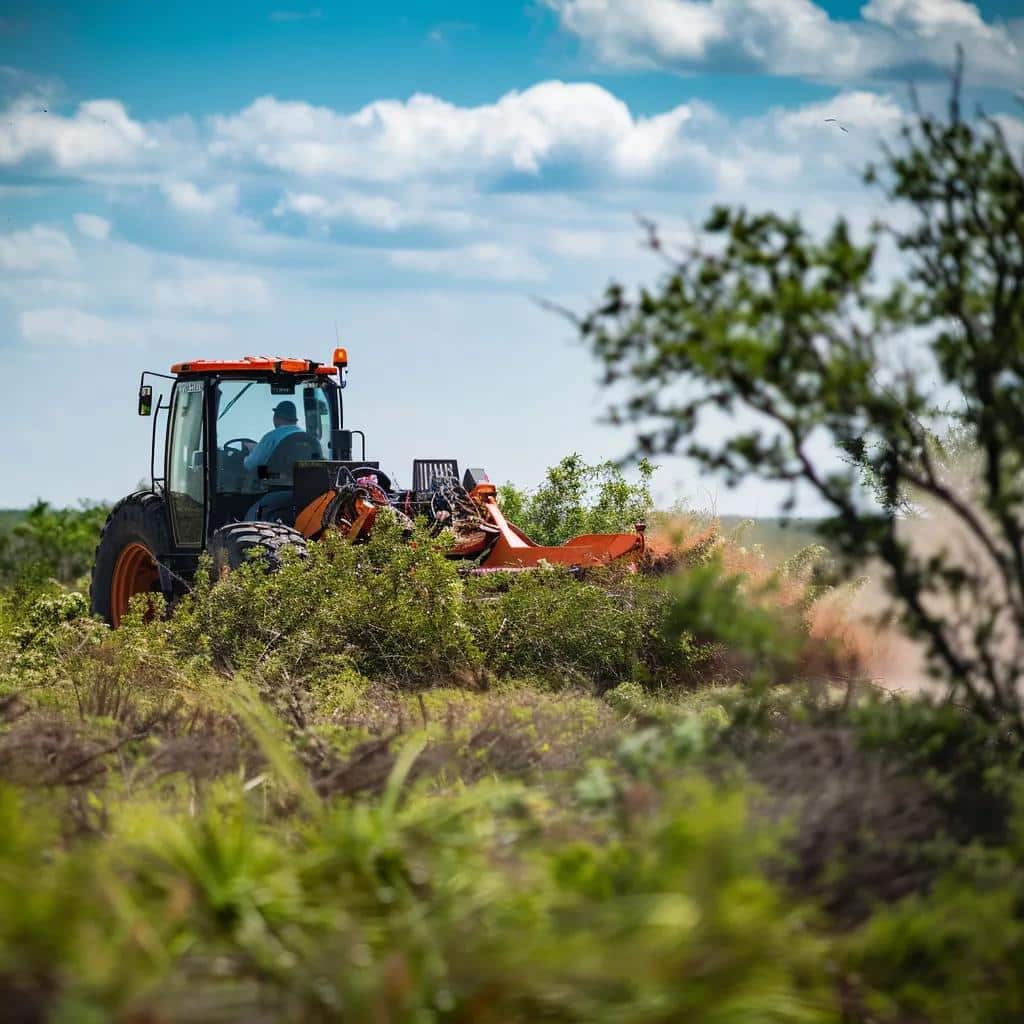
Choosing the right brush clearing method starts with understanding your land’s specific needs. Whether you’re creating firebreaks, prepping for construction, or restoring pasture, professional services use a variety of tools and techniques tailored to terrain and vegetation.
From eco-conscious mulching to heavy-duty dozing, here’s a breakdown of the most effective brush clearing methods and the equipment behind them:
| Method | Attribute | Ideal Application |
|---|---|---|
| Forestry Mulching | Eco-friendly vegetation removal | Dense brush, saplings, undergrowth; produces soil-enriching mulch |
| Dozer & Excavator | Bulk removal and earthmoving | Heavily wooded lots, stumps, rocky terrain; site grading |
| Skid Steer & Brush Hog | Precision cutting | Fence lines, fence-row clearing, urban lot cleanup |
| Chainsaw & Hand Tools | Manual trimming | Sensitive areas, around structures, selective removal |
This overview shows how each method balances efficiency, cost, and environmental impact, helping you choose the right solution for your land goals.
Next, we explore how forestry mulching works and why it’s one of the most in-demand clearing methods across Texas.
Forestry Mulching as a Sustainable Land Clearing Method
Forestry mulching uses a high-torque rotary head mounted on a skid steer or track loader to shred brush into nutrient-rich mulch. This single-pass process clears vegetation while leaving a protective ground layer that stabilizes soil and retains moisture.
Key benefits of forestry mulching include:
On-site biomass recycling that helps control erosion
No hauling or burning—reducing emissions and eliminating the need for permits
Minimal ground disturbance, ideal for preserving native soil structure and habitats
Because it eliminates debris cleanup and supports ecological restoration, forestry mulching is a preferred method for landowners across Texas—especially for residential, ranch, and conservation projects in sensitive or regulated environments.
Traditional Clearing with Dozers and Excavators for Full Land Prep
Traditional brush clearing uses heavy equipment like dozers and excavators to remove large trees, uproot stumps, and reshape uneven or rocky terrain. This method is ideal for full-scale land development where complete surface preparation is required.
It’s best suited for projects such as:
Clearing wooded lots with mature trees or dense root systems
Leveling land for roads, building foundations, or utility lines
Preparing sites for agriculture, fencing, or subdivision development
While more disruptive than other methods, traditional clearing ensures a fully graded, build-ready surface—making it the right choice for large construction or agricultural conversions where precision and power are non-negotiable.
Specialized Equipment That Enhances Brush Clearing Efficiency
Professional brush clearing services often deploy specialized equipment to handle unique site conditions with precision and speed. These tools are chosen based on terrain, vegetation type, and project goals—ensuring effective results across a wide range of property types in Texas.
Common equipment includes:
Stump Grinders – Remove root collars to prevent regrowth and ensure clean surface prep
Brush Chippers – Turn branches and debris into reusable or marketable wood chips
Tracked Skid Steer Mulchers – Provide stability and access on uneven, sloped, or soft terrain
Hydro-Ax Attachments – Tackle dense, vine-covered, or moisture-rich areas with aggressive cutting power
When combined with skilled operators, this equipment delivers fast, environmentally responsible brush clearing that aligns with local codes and conservation practices.
Up next, we’ll break down the cost factors of brush clearing services in Texas—so you can better estimate timelines, scope, and investment.
Brush Clearing Service Costs in Texas
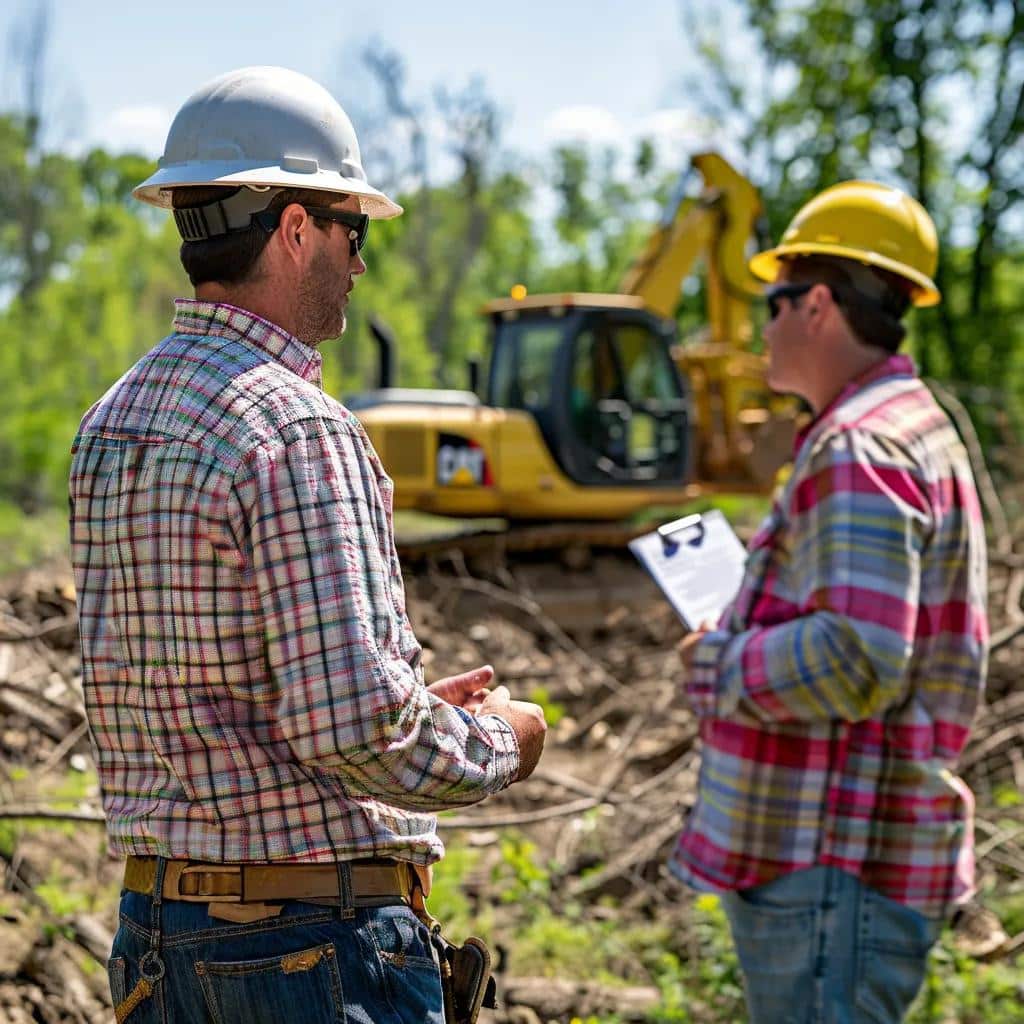
Estimating brush clearing expenses hinges on multiple variables, so understanding cost drivers ensures accurate budgeting. Professional rates range widely based on acreage, density, and terrain. Brush clearing services can help manage these costs effectively.
Factors Affect Brush Clearing Costs Per Acre
Several key factors influence per-acre pricing:
- Vegetation Density: Thick cedar and mesquite require more time and heavier machinery.
- Terrain Complexity: Sloped or rocky sites slow operations and may need specialized attachments.
- Accessibility: Remote or gated properties add mobilization fees.
- Service Scope: Inclusion of stump removal, grading, or debris hauling increases total.
- Permitting & Regulations: Compliance with burn bans or local codes can add administrative costs.
This citation provides a detailed breakdown of the factors that influence brush clearing costs, as discussed in the article.
Average Price Range for Brush Removal Services Near Me
In Texas, average brush clearing costs span:
- $330–$630 per acre for light underbrush and open lots.
- $1,500–$3,000 per acre for moderately wooded parcels with saplings.
- $3,800–$6,700 per acre for heavily wooded acreage requiring stump extraction.
Transparent pricing models include all labor, equipment, and debris management—saving surprise expenses and facilitating project planning.
Get a Free Quote for Local Brush Clearing
Requesting a complimentary estimate involves:
- Contacting certified local contractors via phone or online form.
- Providing property size, vegetation photos, and site access details.
- Scheduling a no-obligation site visit to refine scope and pricing.
- Receiving a detailed written proposal outlining services and timelines.
Engaging early with professionals accelerates project kickoff and ensures accurate budgeting.
Standard Brush Clearing Process in Texas
A professional brush clearing project in Texas follows a structured process designed to ensure safety, efficiency, and minimal environmental disruption. Most reputable contractors operate within a three-phase system: site assessment, clearing and safety execution, and post-job cleanup. This standardized workflow provides consistent results across residential, ranch, and commercial properties.
Site Assessment Conducted for Brush Clearing
Every successful brush clearing project starts with a thorough on-site assessment. Crews walk the property to evaluate vegetation density, terrain, and any sensitive or protected features. This phase is critical to building a customized action plan based on the land’s unique conditions.
Key activities during this phase include:
- Mapping boundaries, access roads, and any trees to be preserved
- Evaluating soil conditions to avoid unnecessary compaction
- Identifying above- and below-ground utilities, culverts, and drainage paths
The insights gained during this assessment guide both equipment selection and operational planning, laying the groundwork for a safe and effective clearing operation.
Safe Execution and Operational Protocols
Once the plan is in place, crews move into active clearing. Certified operators follow strict safety procedures that protect the land, the team, and nearby infrastructure. These protocols are especially important in high-risk environments like dry rural areas or rocky terrain.
Safety measures include:
- Mandatory use of personal protective equipment (PPE) for all crew members
- Marking exclusion zones with flags or signage around machinery
- Fire watch protocols during dry, high-temperature conditions
- Daily maintenance checks and logs for all active equipment
This disciplined approach ensures that brush removal proceeds without unnecessary risk or disruption—setting the stage for a clean finish.
Post-Clearing Cleanup and Land Preparation
After brush has been removed, the final phase involves debris management and land conditioning. This is where the site is prepared for its next use—whether that’s fencing, planting, or new construction.
Typical cleanup tasks include:
- Grinding stumps below surface level to eliminate hazards and regrowth
- Mulching or chipping brush on-site to reduce hauling and enrich the soil
- Distributing mulch across exposed areas to prevent erosion
- Removing leftover debris such as metal, trash, or invasive roots
By the end of this phase, landowners are left with a clean, accessible, and usable landscape—ready for whatever comes next.
Benefits of Local Brush Clearing Services
While DIY brush removal might seem cost-effective at first glance, local professional services offer faster timelines, safer operations, and significantly better long-term results. By combining advanced equipment with regional expertise, Texas-based contractors deliver outcomes that are both efficient and environmentally sound.
The Role of Professional Equipment in Brush Removal
Unlike consumer-grade tools, professional-grade brush clearing machinery is built to handle dense undergrowth, thick saplings, and rugged terrain without compromising speed or safety. Forestry mulchers, skid steers, and hydro-ax systems streamline the clearing process while minimizing disruption to the soil.
Key advantages include:
- High-torque cutting heads that handle dense brush effortlessly
- Integrated mulching systems that eliminate the need for hauling debris
- Precision control for clearing around fences, trees, and structures
- Shorter project timelines that reduce labor costs and site downtime
This equipment isn’t just about power—it’s about performance at scale, particularly on large rural properties or challenging lots.
How Regional Expertise Improves Results
Local brush clearing contractors understand the terrain, vegetation, and regulatory environment specific to Texas. This insight allows them to adapt techniques based on soil type, slope, seasonal growth, and regional burn restrictions.
Benefits of local knowledge include:
- Adjusting mulching depth to match drought-affected root systems
- Navigating city and county permits for fire safety and land development
- Timing projects to avoid peak regrowth seasons or wildlife nesting periods
- Preventing soil compaction on heavy clay or flood-prone land
By tailoring their approach, local crews not only improve efficiency—they also reduce the likelihood of re-clearing or environmental issues later on.
Property Owners Trust Local Brush Clearing Services
Across Texas, landowners consistently report positive experiences with local brush clearing teams. From fast turnaround times to minimal site disruption, professional crews provide peace of mind backed by results.
Customer feedback highlights:
- “Within days, our ranch had clear pasture ready for grazing.”
- “They transformed our overgrown lot into a buildable site—on budget and ahead of schedule.”
- “The crew’s attention to wildlife protection and cleanup was exceptional.”
Reputation, reliability, and regional experience all contribute to why brush clearing services near me that work continue to be the preferred choice for homeowners, ranchers, and developers alike.
Common Questions About Brush Clearing Services Near Me
Clients often wonder how long projects take, how to prevent regrowth, and whether permits are required. This narrative addresses those concerns comprehensively, guiding landowners toward informed decisions without interruptive Q&A formatting.
How Long Does It Take to Clear an Acre of Brush?
Project duration varies by density and method:
- Mulching light underbrush: 1–2 hours per acre.
- Moderate cedar and mesquite thickets: 3–5 hours per acre.
- Heavy stumps and grading: 6–8 hours per acre.
Efficient scheduling and machinery selection optimize timelines for larger properties.
How Do Professionals Prevent Brush from Growing Back?
Long-term control combines: land management
- Stump grinding and targeted herbicide on regrowth points.
- Seasonal follow-up visits timed before seed dispersal.
- Mulch application to suppress germination.
- Soil amendments to encourage native grasses that outcompete brush seedlings.
This integrated approach reduces repeat clearing needs and maintains a clear landscape.
Are Permits Required for Brush Clearing in Texas?
Permit requirements depend on location and method:
- Mulching on private land usually requires no burn permit.
- Controlled burns demand local fire marshal approval.
- Clearing within floodplains or wetlands may trigger state environmental permits.
Consulting local authorities and experienced contractors ensures regulatory compliance and avoids penalties.
Transform your Texas property today with proven expertise, advanced equipment, and environmentally responsible techniques. Contact our team to schedule a consultation and secure a free, no-obligation quote for tailored brush clearing services.
